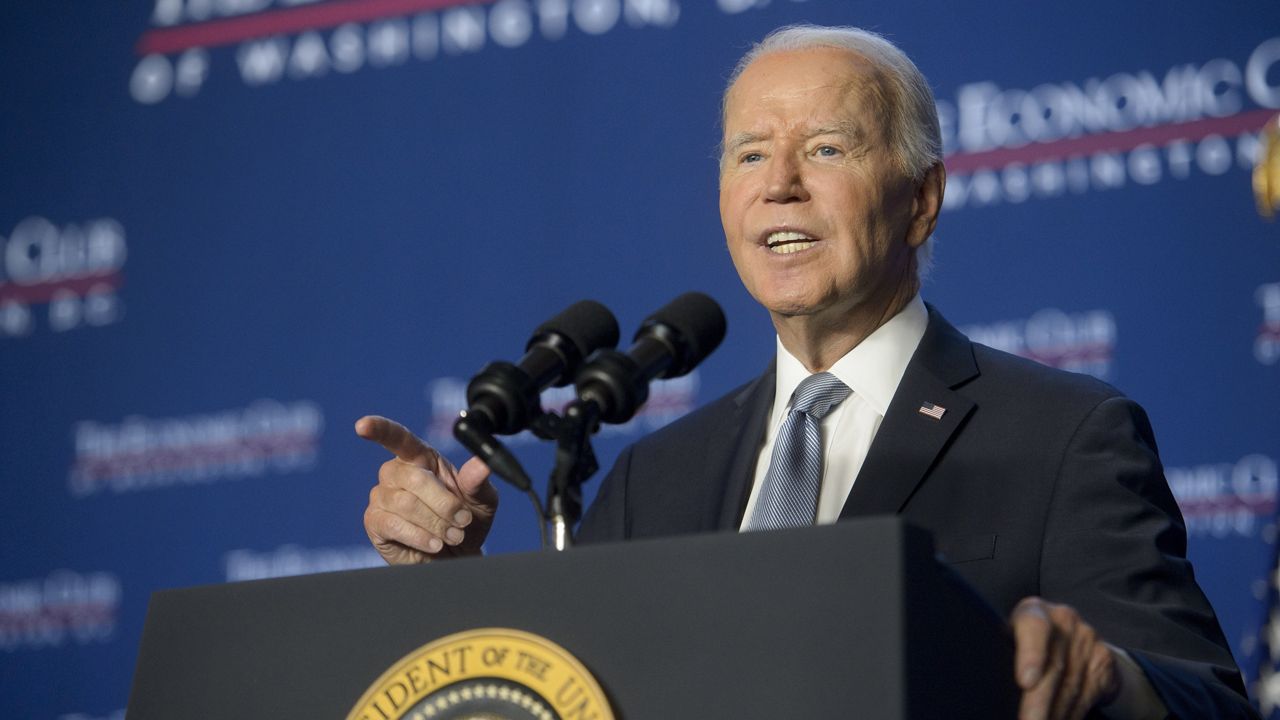Delivering remarks at the Economic Club of Washington, D.C. on Thursday, President Joe Biden sought to make the case that he created a “new economic playbook” that spearheaded significant economic progress in America after being handed a crisis from former President Donald Trump.
At the same time, he made clear he wasn’t declaring victory on the issue, asserting that there is “a hell of a lot more work to do.”
The remarks come as Biden, set to leave office in January, is rounding out his more than five decades-long career in Washington and less than 50 days before a presidential election between his vice president, Kamala Harris, and Trump, in which the economy is poised to be a top concern for voters.
“Four years ago, we inherited the worst pandemic in a century, the worst economic crisis since the Great Depression,” Biden said on Thursday. “In fact, the nonpartisan Congressional Budget Office predicted we wouldn’t see a full recovery until after the end of my first term in office.”
“But I refused to accept that like many of you refuse to accept it,” he continued. “I come to office determined not only to deliver immediate economic relief for the American people but to transform the way our economy works over the long term – create a new economic playbook, grow the economy from the middle out and the bottom up, not just the top down.”
The president went on to tout each of his signature pieces of legislation as “the keys” to his playbook, including the 1.9 trillion American Rescue Plan intended to help the country climb out of the COVID-19 pandemic; the $1 trillion Bipartisan Infrastructure Law designed to, among other things, repair the nation’s aging roads and bridges; the CHIPS and Science Act to bring semiconductor supply chains back to the U.S.; and the $750 billion Inflation Reduction Act, calling it “the most significant climate law ever” while lauding its provisions to lower the cost of prescription drugs. Harris, he made sure to note, cast the tie-breaking vote in her role as vice president to get the Inflation Reduction Act past GOP objections and over the finish line.
“The old playbook was to go abroad to the cheapest labor, export American jobs, and import foreign products,” Biden said, specifically when talking about the CHIPS bill. “Our new playbook is we export American products and create American jobs right here in America where they belong.”
Biden made a point to note that “not a single” Republican voted for the American Rescue Plan and Inflation Reduction Act while pledging that he himself had “kept his promise” to be a president for all Americans (a mantra Harris has now adopted on the campaign trail).
Biden noted that some Democrats are “very angry” because one of his signature laws “actually delivered more benefits to red states than to blue states.”
“That may not have been good politics, but I believe it’s good for the country,” he said.
The president slammed Trump without ever naming the former president for his record on job creation, his signature tax cuts and increasing the federal deficit. He accused Trump of wanting to implement a new sales tax on imported goods if elected again, likely a reference to the former president’s tariff plans, which Harris has equated to a sales tax in effect.
Biden also used his remarks on Thursday to address the Federal Reserve’s decision on Wednesday to cut its benchmark interest rates for the first time in four years as it sought to cool inflation but in return made borrowing particularly expensive.
The president on Thursday said the Federal Reserve’s half-point cut on Wednesday signals that “we’ve entered a new phase of our economy and our recovery.”
“So now, instead of looking at interest rates increases, interest rates are going to be coming down, and they’re expected to go down further,” he said. “And that’s a good place for us to be.”
Biden later made a point to emphasize that he has “never once spoken” with Federal Reserve Chairman Jerome Powell since he became president, arguing that the central bank’s “independence has served the country well.”
Council of Economic Advisors Chair Jared Bernstein clarified at Thursday’s White House press briefing that Biden has never spoken to Powell about interest rates specifically while Biden has been president. He argued Biden’s determination to restore the independence of the central bank is a sharp contrast to Trump’s approach to the Federal Reserve while he was in office.
The president ended by speaking about democracy in what could be seen as another criticism of his predecessor, who he has often calls a “threat” to it.
“We have stability because we have a rule of law,” he said. “But it’s really under stress. For real. We can never lose those democratic principles.”
Inflation peaked at 9.1% while Biden was in office in 2022, but has since come down to a three-year low of 2.5%. The Fed’s target rate is 2%. Trump has sought to use the surge in inflation that occurred during Biden’s time in office – despite coming down – as a key line of attack on Harris.



